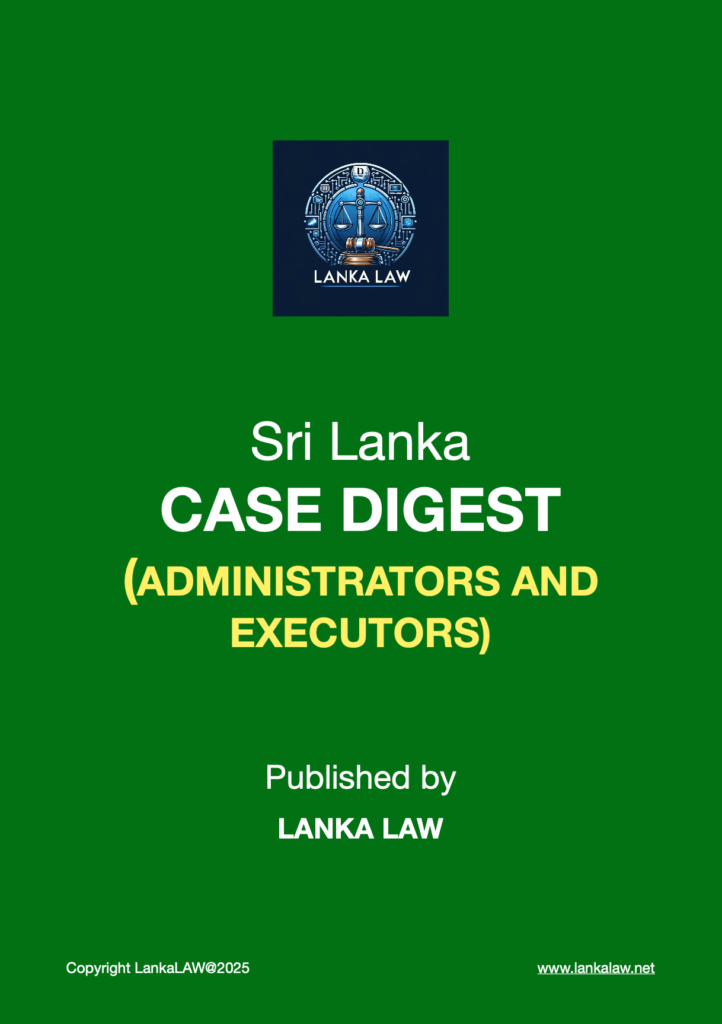Introduction In Sri Lanka, the roles of administrators and executors are crucial in managing and distributing the estate of a deceased person. Their legal standing, responsibilities, and duties are guided by statutory laws and judicial precedents. This article delves into the administration of estates under Sri Lankan law, highlighting key legal principles and relevant case law.
Legal Framework The administration of estates in Sri Lanka is governed by the Civil Procedure Code, the Wills Ordinance, and the Trusts Ordinance. An executor is a person appointed by the deceased through a will, whereas an administrator is appointed by the court when a person dies intestate (without a will).
- Executors: They derive their authority from the will and are responsible for executing the deceased’s wishes as per the testamentary document.
- Administrators: Appointed by the District Court under the Administration of Estates Ordinance, administrators act in cases where no will is present or when executors fail to perform their duties.
Key Responsibilities Both executors and administrators have several responsibilities, including:
- Collecting and safeguarding the assets of the deceased.
- Settling outstanding debts and liabilities.
- Distributing the remaining estate among the rightful heirs or beneficiaries.
- Submitting accounts to the court and complying with legal formalities.
Judicial Precedents and Notable Cases Sri Lankan courts have adjudicated numerous cases that have shaped the interpretation and enforcement of laws relating to administrators and executors. Some notable cases include:
- Soysa v. Abeydera (NLR Vol. 12 p 349) – This case examined the authority of an executor in dealing with estate properties.
- Sivasubramaniam v. Thamotherampillai (NLR Vol. 13 p 18) – Addressed issues regarding contested wills and the appointment of administrators.
- Babun Appu et al. v. Waidasekera (NLR Vol. 20 p 62) – Highlighted the fiduciary duty of an administrator towards beneficiaries.
- Gunawardene v. Jayawardene (NLR Vol. 40 p 137) – Established principles regarding the misuse of estate funds by executors.
- The Public Trustee v. Karunaratne (NLR Vol. 40 p 429) – Discussed the role of the Public Trustee in overseeing estate administration.
- Ramalingam v. Kailasapillai et al. (NLR Vol. 43 p 425) – Analyzed the liability of executors for mismanagement of assets.
Challenges in Estate Administration Despite the well-defined legal structure, estate administration in Sri Lanka faces several challenges:
- Delays in Court Proceedings: Lengthy legal processes can hinder the timely administration of estates.
- Disputes Among Heirs: Contentious claims often arise over the distribution of assets, necessitating court intervention.
- Mismanagement of Estate Funds: Executors and administrators must act in good faith, as mismanagement can lead to legal consequences.
Conclusion The administration of estates in Sri Lanka requires strict adherence to legal provisions and judicial precedents. Executors and administrators play a vital role in ensuring that a deceased person’s estate is distributed fairly and legally. By understanding their responsibilities and legal obligations, they can navigate estate administration effectively while minimizing disputes and legal complications.
Download Case Laws















